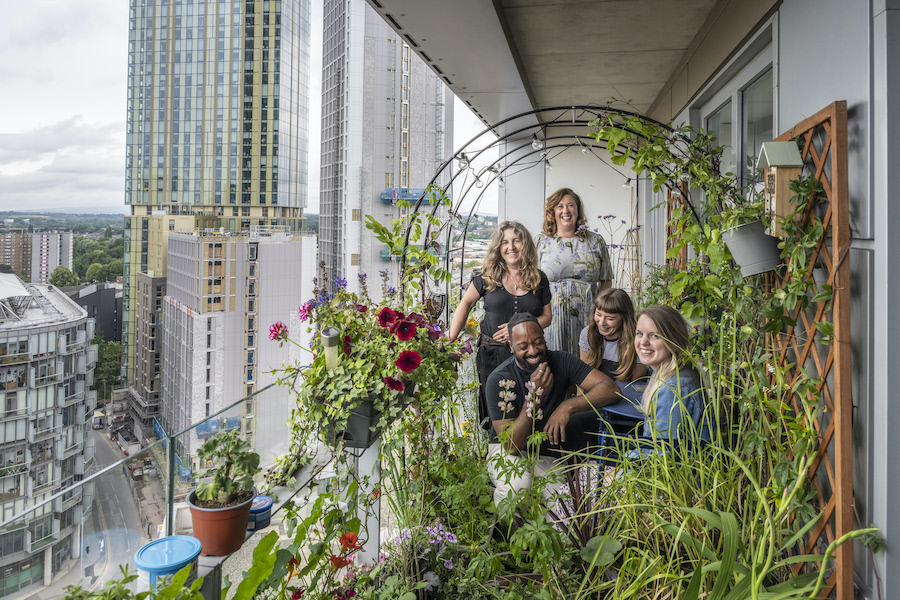The incredible 165-year history of the Halle Orchestra
- Written by Thom Bamford
- Last updated 2 years ago
- City of Manchester, Cornerstone, Featured, History, Music
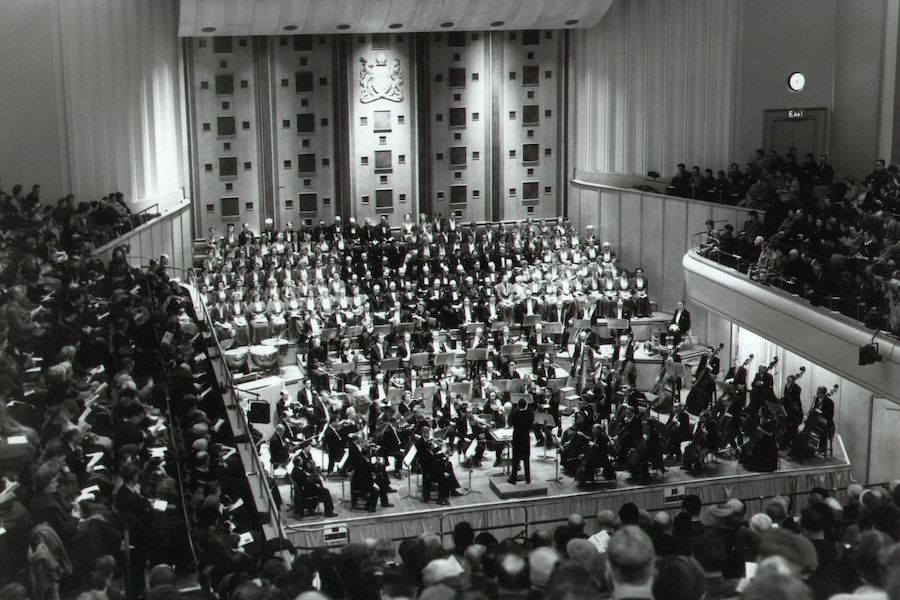
Back in the days amongst the bustle of the city’s industrial works, a musical revolution was taking shape, led by the vision of a German-born pianist and conductor, Sir Charles Hallé.
It was a time when the clang of factories and the roar of machinery defined the landscape, but in the midst of this urban cacophony, Sir Charles dared to dream of something different, something transformative—a dream that would resonate through the ages and shape the destiny of Modern Manchester.
In 1858, against all odds, Sir Charles Hallé brought to life his dream, founding the Hallé Orchestra and embarking on a musical journey that would span over a century and a half.
And it’s still going strong. 165 years later.
The Hallé Orchestra, one of the UK’s most venerable musical institutions, has a rich and storied history.
From its humble beginnings to its current position as a world-renowned ensemble, the Hallé is without peer in Manchester.
So let’s go through the history of the Hallé Orchestra.
The History of the Halle Orchestra
The Hallé gave its first concert on 30 January 1858 under the baton of its founder Sir Charles Hallé.
Eleanor Roberts, the Hallé’s Archivist, sheds light on the orchestra’s origins, saying, “In 1857, Manchester hosted the Arts Treasures Festival, a counterpoint to the Great Exhibition at Crystal Palace in 1851.
“Charles Hallé provided the music for this monumental spectacle, which took place in a pavilion roughly on the same spot where Old Trafford stands today.”
The success of this festival was a turning point.
Eleanor continues, “Because this event was so successful, he grew the orchestra as people’s appetite for classical music was growing with the times.
“He was ambitious with the music on display, picking big symphony pieces. After the success of the exhibition, he decided to grow the orchestra as the interest was clearly there, and they started to perform on a much more regular basis.”
Thus, on the 13th of January 1858, the Hallé Orchestra was born, a testament to Sir Charles Hallé’s vision and the city’s hunger for classical music.
Until his untimely death in 1895, he personally conducted nearly every concert and graced audiences with his piano virtuosity.
His sudden passing sent shockwaves through Manchester and the wider musical world, with his funeral procession bringing the city to a poignant standstill.
But the story of the Hallé Orchestra did not end with Sir Charles’s passing. Three loyal friends—Henry Simon, Gustav Behrens, and James Forsyth—swiftly rallied to secure the orchestra’s future.
1895 Hallé Concerts Society Formed
In the fall of 1895, a sombre cloud descended upon the Hallé Orchestra as its visionary founder, Sir Charles Hallé, breathed his last.
However, his indomitable spirit and his commitment to music lived on through the dedicated efforts of Henry Simon, Gustav Behrens, and James Forsyth, loyal friends who were determined to preserve the orchestra’s legacy.
As the year drew to a close, Eleanor Roberts, the Hallé’s Archivist, recounts the pivotal moment, saying, “Halle died in October 1895 – he had already planned out and sold tickets for the next season. Three of his friends got together and said that they guaranteed that season against loss so everything could take place as planned.”
Sir Charles’s unwavering desire for the orchestra’s continuity was shared by these three friends, and they pledged to ensure its survival. But their commitment went beyond a single season.
Roberts continues, “He wanted the orchestra to continue, so the same three friends got together and said they would use the next three years to come to a properly constituted concert society.”
And so, in the wake of Sir Charles Hallé’s passing, the Hallé Concerts Society was born, an institution that would safeguard the orchestra’s future and preserve its legacy.
This transition was not without its challenges, but it marked a new beginning, a chapter in the orchestra’s history that would carry forward the torch of classical music in Manchester.
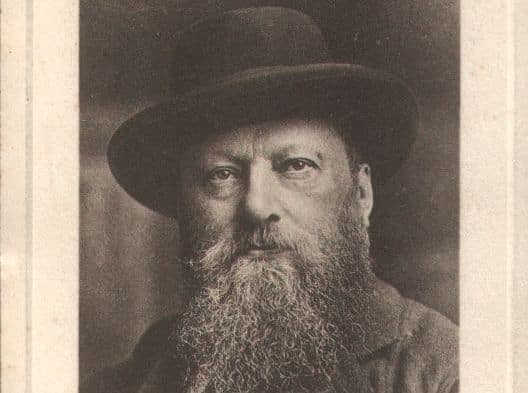
Leading this new chapter was the illustrious Dr. Hans Richter, appointed as the Principal Conductor of the Hallé Orchestra. Eleanor Roberts recalls, “Dr. Hans Richter was appointed off the bat, invited to come and take over as principal. He was the most famous conductor in the world at the time, well known for having conducted the first Wagner’s Ring Cycle and even the Vienna Philharmonic.”
1919 Hallé’s first commercial recordings

In 1919, as the world emerged from the shadows of World War I, the Hallé Orchestra embarked on a new journey under the leadership of Sir Hamilton Harty, who had been appointed as its Principal Conductor.
Harty was not just a conductor but a pioneer, eager to embrace the cutting-edge technology of recording.
Under the baton of Sir Hamilton Harty, the Hallé Orchestra entered the world of commercial recordings, marking a significant milestone in its illustrious history.
Eleanor Roberts, Hallé’s Archivist, provides insights into this groundbreaking period, saying, “Sir Hamilton Harty embraced the latest in recording technology, and under him, the famous ‘nymph and shepherd’ recording was made with Manchester schoolchildren, serving as the background music for the film ‘Victoria Wood: That Day We Sang.'”
This innovative recording was nothing short of a sensation.
It was a musical collaboration with the local youth, adding a unique and heartwarming dimension to the orchestra’s repertoire.
As Eleanor recounts, “They won a gold disc with the recording—a remarkable achievement—but probably didn’t make the orchestra much money.”
Sir Hamilton Harty’s vision extended beyond music.
He recognised that the recording industry was a burgeoning frontier, offering new opportunities for both artistic expression and financial sustainability.
To secure extra rehearsal time and resources for the orchestra, Harty negotiated a lucrative contract with Columbia Records.
However, amidst this trailblazing spirit, Harty’s views on gender inclusion remained more conservative.
He was known for his reluctance to embrace the small number of women who had joined the orchestra during the war, a stark contrast to the orchestra’s earlier acceptance of female musicians during Sir Charles Hallé’s time.
Harty’s tenure as Principal Conductor was marked by both pioneering strides in recording technology and a more traditional approach to orchestra composition.
Ultimately, in 1933, he concluded his time with the Hallé Orchestra.
1943 The arrival of Sir John Barbirolli
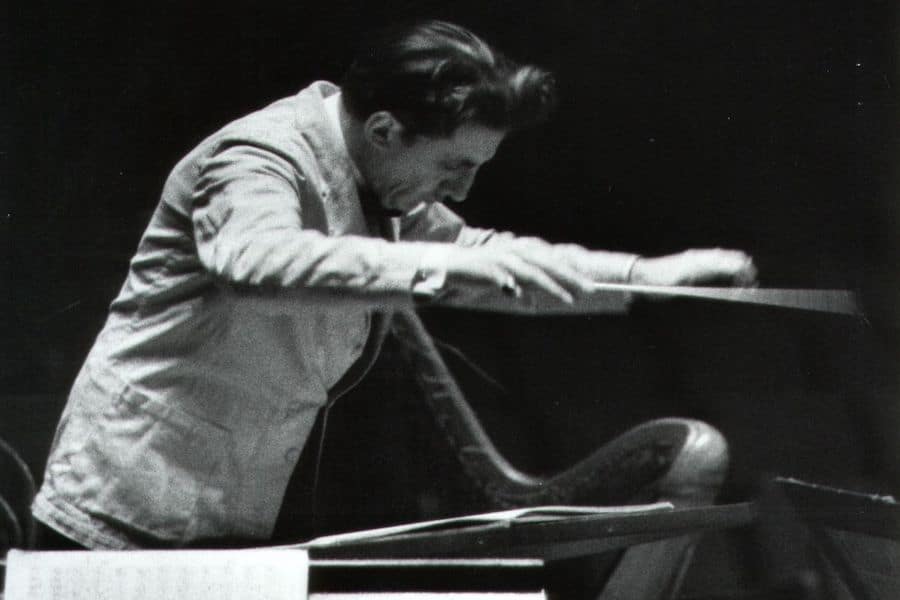
During the tumultuous year of 1943, the Hallé Orchestra found itself in search of a new leader. Sir Hamilton Harty, who had guided the orchestra for many years, had left his post in the early 1930s, leaving a void in the conductor’s podium.
It was a challenging period marked by uncertainty, both in the world and within the orchestra itself.
World War II was raging, and live concerts and broadcasts took on newfound significance as morale-boosting tools.
The Hallé Committee recognised the need for a new conductor, and the search for someone who could not only fill the role but also inspire hope and creativity in a time of adversity was paramount.
Up until that point, orchestras typically operated on a half-yearly contract, spanning from autumn to spring.
Many musicians would then migrate to various seaside towns to perform in pier orchestras during the summer months. It was against this backdrop of uncertainty that the Hallé Orchestra sought to find its new leader.
Sir John Barbirolli emerged as the orchestra’s saviour.
At the time, he had been conducting the New York Philharmonic but was deeply unsettled by the prospect of being safe in America while his homeland was at war. His return to England in May 1943 was met with great anticipation, but a twist of fate awaited him.
Upon his arrival, Sir John was under the impression that he would be inheriting a fully assembled orchestra.
However, the Hallé Committee had offered a permanent contract to the orchestra, which was divided with the BBC Philharmonic. In a remarkable turn of events, the musicians were given a choice of which orchestra to join, and the overwhelming majority chose the BBC Philharmonic.
Despite this initial setback, Sir John Barbirolli’s tenure as Principal Conductor marked a transformative period for the Hallé Orchestra. The decision to put the orchestra on a 52-week contract for the first time was a pivotal moment, ensuring a more stable and committed ensemble.
Sir John’s arrival and his dedication to the Hallé left an indelible mark on both the orchestra and the city of Manchester. His first concert, only six weeks after his arrival, became a legendary moment in the orchestra’s history.
“We have people in our audience today whose first experiences were conducted by Sir John, including the school concerts done back in the day. He is still held in great affection,” reflects Eleanor Roberts, the Hallé’s Archivist.
Sir John Barbirolli holds the distinction of being the second longest-serving conductor in the orchestra’s history. Under his leadership, women returned to the orchestra in significant numbers for the first time since they were removed during World War I. His open-minded and inclusive approach allowed women to join the ranks and play any instrument, breaking down barriers within the orchestra.
During his time, the Hallé Orchestra embarked on their first foreign tours while the war still raged, sharing their music with troops and local communities near the front lines in Belgium and the Netherlands. In 1948, the orchestra journeyed to Austria, contributing to post-war reconciliation through the power of music.
Sir John Barbirolli’s remarkable legacy with the Hallé Orchestra continued until his passing in 1970. He led the orchestra on numerous foreign tours, expanded its recorded repertoire significantly, and played a pivotal role in women’s reintegration into the ensemble as permanent players.
Looking for a Home After the Free Trade Hall
The tumultuous year of 1939 marked the outbreak of World War II, and with it came the move back to the Free Trade Hall.
The dark cloud of war descended upon Manchester, casting a shadow over the city, and the Free Trade Hall was not spared from the ravages of conflict, succumbing to bombing during the Manchester Blitz.
Despite this, the show went on for the Halle.
Throughout the war, the orchestra embarked on concert series held in alternative venues, embracing the opportunity to bring music to the hearts of the people.
The Albert Hall, Kings Hall Belle Vue, and various cinemas in and around Manchester all served as stages for their performances, echoing with melodies of hope in a time of uncertainty.
It wasn’t until 1951 that the Free Trade Hall rose from the ashes of destruction.
A phoenix-like rebirth, it opened its doors with a triumphant season of concerts, symbolising resilience and renewal.
The Hallé Orchestra returned to its hallowed stage, serenading audiences once more.
However, the Free Trade Hall’s tenure as the Hallé Orchestra’s home would soon come to an end.
On June 30, 1996, the orchestra bid a fond farewell to its historic abode, marking the end of an era. It was time for the orchestra to embark on a new chapter in its journey.
The Bridgewater Hall, located just a few minutes walk away, would become the orchestra’s magnificent new home.
This state-of-the-art concert hall was purpose-built with the Hallé in mind, designed to meet the demands of classical music in the modern age.
As the Hallé Orchestra set foot within its walls, it found itself not only in a new home but in a space that embodied the spirit of evolution and progress.
The rebuilt Free Trade Hall, which had stood as a symbol of resilience and renewal, would remain a cherished part of the orchestra’s history.
Its façade retained the echoes of the past, while its interior was entirely new, a testament to the enduring legacy of the Hallé Orchestra.
1970 Hallé tours to the Far East
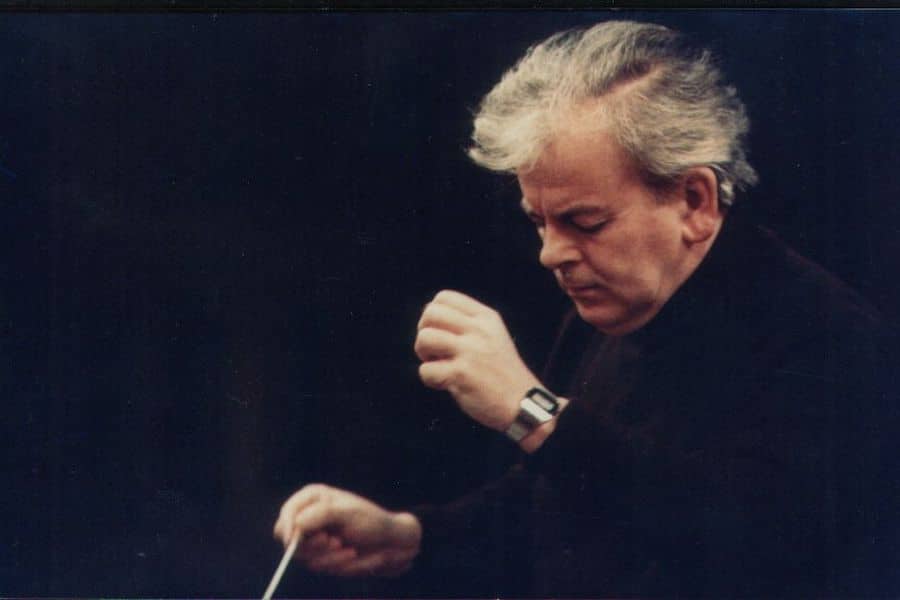
Following the death of Sir John Barbirolli, James Loughran is appointed Principal Conductor.
During his years in post the Hallé toured to the Far East for the first time with several appearances at the Hong Kong Arts Festival.
1983 Stanislaw Skrowaczewski appointed
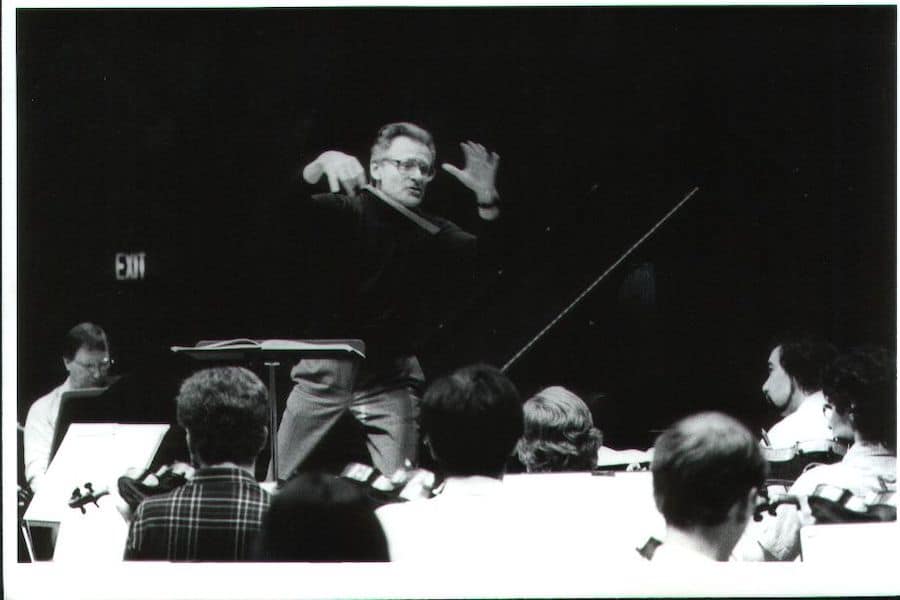
Stanislaw Skrowaczewski is appointed Principal Conductor.
In 1987 the Hallé toured to the United States for the first time.
Following his departure in 1991 Stanislaw made many return visits to conduct, most famously travelling all the way from Warsaw by car in 2010 when planes were grounded by the Icelandic ash cloud.
1996 Halle’s new home: The Bridgewater Hall
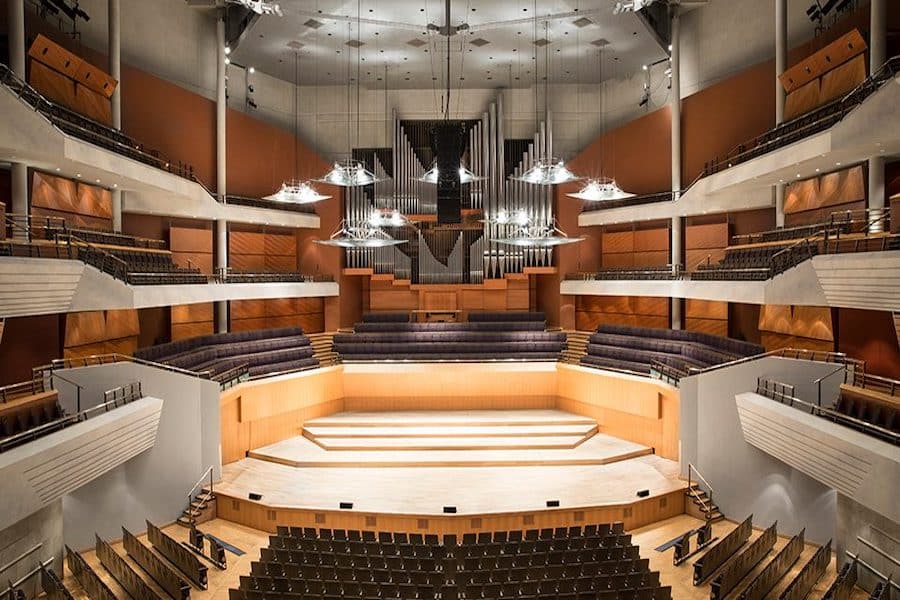
The late 20th century brought a momentous transformation for the Hallé Orchestra, marked by a pivotal change in its home and leadership.
The Free Trade Hall, once a beacon of musical excellence, had served its purpose but was showing signs of age, particularly in the realm of acoustic technology.
By the mid-1990s, it was clear that a new venue was needed to meet the demands of modern classical music.
The solution came in the form of The Bridgewater Hall, a purpose-built classical concert hall that stood as a testament to the Hallé Orchestra’s commitment to excellence.
Designed with the specific needs of the orchestra in mind, it was the epitome of state-of-the-art sophistication.
As the Hallé Orchestra’s new sanctuary, The Bridgewater Hall was poised to become a cornerstone of Manchester’s cultural landscape.
In tandem with this transition, Kent Nagano assumed the role of Principal Conductor and Music Director.
His appointment heralded a new era for the orchestra, filled with promise and musical innovation.
The momentous shift was inaugurated in September 1996 when Kent Nagano conducted the Hallé Orchestra in its very first concert at The Bridgewater Hall.
This historic event marked the beginning of a vibrant chapter in the orchestra’s history.
A series of opening concerts celebrated the orchestra’s new home, showcasing the depth of talent and the sonic wonders that The Bridgewater Hall could offer.
The culmination of years of planning and dedication, this transition underscored the Hallé Orchestra’s unwavering commitment to the people of Manchester and its dedication to the cause of classical music.
Reflecting on the Hallé Orchestra’s enduring journey, Eleanor Roberts, the Hallé’s Archivist, noted that throughout its history, the orchestra had never wavered in its mission to bring the beauty of classical music to the heart of Manchester.
“It had always embraced an entrepreneurial spirit, seeking to innovate and push boundaries.
“The legacy of Charles Hallé, the orchestra’s founder, continued to inspire this sense of innovation. He was not only a musician but an entrepreneur in his own right, laying the foundation for the orchestra’s enduring spirit of exploration.
“This spirit of “why not Manchester?” has driven the Hallé Orchestra throughout its history, pushing the boundaries of what was possible. It paved the way for institutions like the Royal Northern College of Music (RNCM), which also had its origins with the Hallé in a similar fashion, fostering a culture of artistic excellence in Manchester.”
The Hallé Orchestra’s commitment to progress and inclusivity was further exemplified in January 1997 when Lyn Fletcher was appointed Leader, becoming the first woman to hold this position. Her appointment marked a significant step forward, underscoring the orchestra’s dedication to diversity and longevity in its leadership.
As the Hallé Orchestra embarked on its journey at The Bridgewater Hall, it carried with it a legacy of innovation and resilience. This new chapter in its history would continue to resonate with audiences, proving that the spirit of the orchestra remained as vibrant and pioneering as ever.
2000 – Sir Mark Elder as Music Director
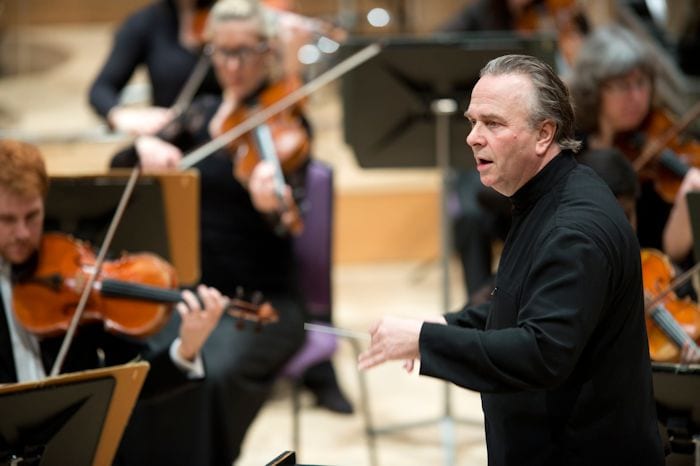
For an astounding 23 years, Mark Elder has led the orchestra, cementing his place as one of its longest-serving and most dedicated members.
Under Mark Elder’s baton, the Hallé Orchestra witnessed a period of profound change and growth. His vision and leadership breathed new life into the ensemble, fostering a spirit of evolution and expansion that resonated with the orchestra’s legacy.
One of the most significant achievements during Mark Elder’s tenure was the exponential growth of the Hallé’s Youth Orchestra and the establishment of multiple choirs. These additions expanded the Hallé ‘family,’ providing a platform for young musicians and vocalists to nurture their talents alongside the orchestra’s seasoned professionals. These initiatives not only enriched the musical landscape of Manchester but also ensured the continuity of classical music for generations to come.
A hallmark of Mark Elder’s era was the establishment of the Hallé’s own recording label in 2003. This pioneering move allowed the orchestra to share its artistry with a global audience, marking a new era of recordings that captured the essence of the Hallé’s performances. Through this label, the Hallé Orchestra’s music became a timeless treasure, reaching far and wide.
However, Mark Elder’s impact extended beyond just recordings. His commitment to education programs was instrumental in introducing people to the world of music, encouraging participation, and building future audiences. His vision was clear: he wanted people to have the opportunity to experience the magic of a live orchestra, creating unforgettable moments that would resonate with them for a lifetime.
This dedication to education was reflected in the formation of the Hallé’s Youth Orchestra in 2002, followed by the Youth Choir in 2003, and the Children’s Choir in 2008. These ensembles became vital avenues for young talents to nurture their love for music, learning from the very best under the Hallé Orchestra’s umbrella.
A new era of recordings also begins with the launch of the Hallé’s own label in 2003.
2013 The birth of Hallé St Peter’s
In 2018, a new chapter began as work commenced on Hallé St Peter’s, a dedicated rehearsal space that would soon become the heartbeat of the orchestra and its various ensembles.
This was an endeavour of great significance, as it marked a departure from the Hallé’s longstanding practice of borrowing venues for rehearsals. Now, the Hallé had a home of its own, a place where the orchestra could convene, practice, and create music in a space that resonated with its spirit.
The transformation did not end there. In 2018, an extension known as the Oglesby Centre was introduced, enhancing the capabilities of Hallé St Peter’s and solidifying its role as a hub for artistic exploration and community engagement.
This extension, which opened its doors in November 2019, was a testament to the orchestra’s commitment to growth and inclusivity.
Sir Mark Elder, during his tenure, envisioned a future where the Hallé Orchestra had a permanent home—a base from which they could rehearse, educate, and engage with the community. Hallé St Peter’s was not merely a rehearsal space; it was a manifestation of this vision.
A source of immense pride for the orchestra and its supporters, it marked a significant step towards securing a lasting legacy.
One of the key aspects of Sir Mark’s era was the focus on education and community work. Hallé St Peter’s became a focal point for these endeavours, providing a platform for nurturing young talent and engaging with the community on various levels.
2020 Inaugural Siemens Hallé International Conducting Competition
The year starts with the inaugural Siemens Hallé International Conducting Competition in February, won by Delyana Lazarova from Bulgaria.
A month later concerts are cancelled (for the first time in Hallé history) as the country enters lockdown.
It is not until November that the Hallé are able to bring the players back to rehearse – under socially distanced conditions – for a digital concert series.
2021 Life after lockdown
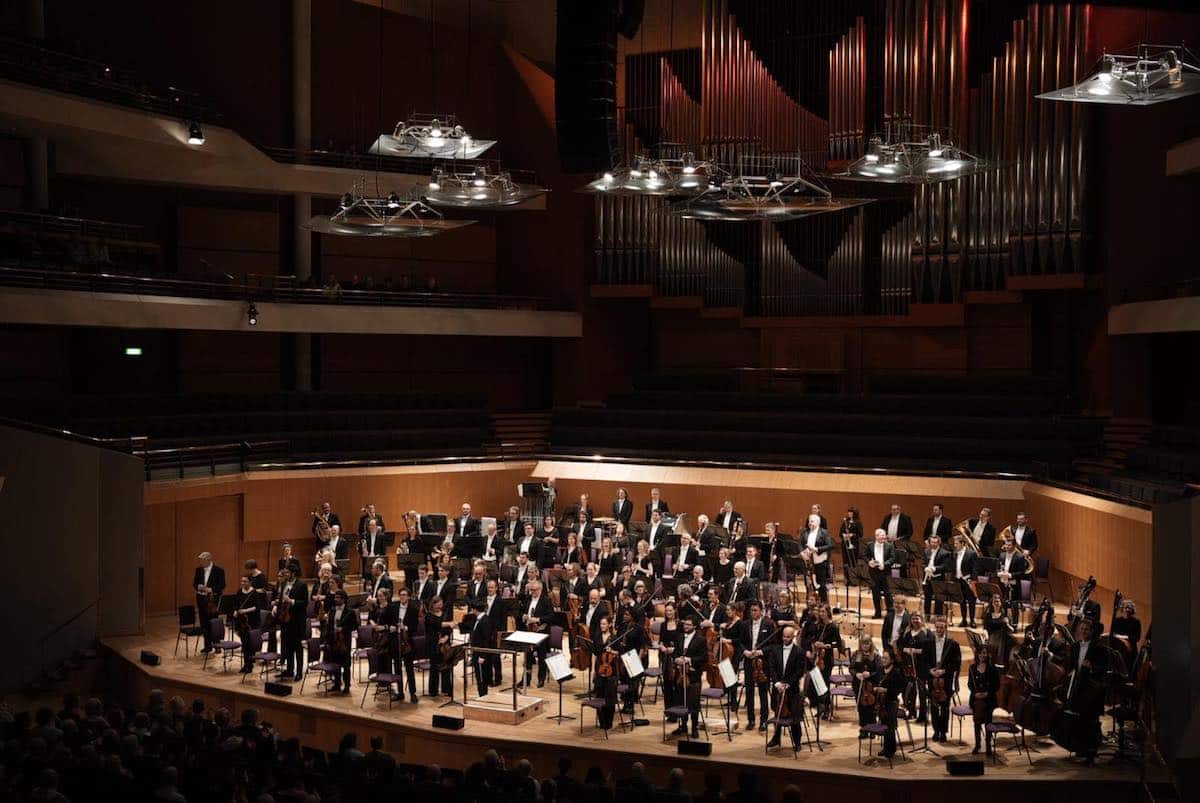
The Hallé Orchestra’s history is a testament to its resilience and adaptability, but perhaps no challenge tested its mettle as severely as the COVID-19 pandemic.
In response to the unprecedented circumstances, the Hallé Orchestra showed its unwavering commitment to music and its audience by embracing innovation and digital transformation.
When the world came to a standstill in the face of the pandemic, the Hallé refused to be silenced.
They embarked on a digital concert series that provided a lifeline to music lovers around the world.
But the Hallé didn’t stop at music alone. They recognised that their audience sought connection and engagement during these trying times. To meet this need, they integrated a range of additional content into their digital series.
Talking heads, interviews, and behind-the-scenes glimpses provided a holistic experience that transcended the boundaries of a traditional concert. This approach not only enriched the musical experience but also fostered a sense of community among viewers.
the Hallé Orchestra found solace in the knowledge that music has always been a source of joy during tough times. It is a universal language that transcends barriers, and the Hallé Orchestra has been an integral part of Manchester’s cultural life and history for over a century and a half.
In June 2021, the Hallé Orchestra marked a poignant moment as they returned to live performances after 14 months of hiatus. The Bridgewater Hall, their esteemed home, welcomed them back, albeit with socially distanced audiences. It was a significant step towards normalcy, a testament to their resilience, and a symbol of the enduring power of music to bring people together.
The 2021-22 season saw the Hallé Orchestra’s triumphant return, with January 2022 marking a milestone—the first concert with the full forces of the orchestra and choir, performed to a sold-out auditorium.
2023 HRH Duchess of Edinburgh opened the Oglesby Centre
The Siemens Hallé International Conducting Competition is a pivotal event in the Hallé Orchestra’s calendar, one that not only celebrates the art of conducting but also serves as a powerful platform for emerging talents from around the world.
This competition is a testament to the Hallé Orchestra’s commitment to fostering the growth of gifted conductors and ensuring the continuity of musical excellence.
The competition’s significance lies not only in its celebration of conducting as an art form but also in the life-changing opportunities it offers to its winners.
The victorious conductor of this competition is bestowed with the prestigious title of Assistant Conductor of the Hallé Orchestra.
The Assistant Conductor works alongside the Hallé’s Music Director, the esteemed Sir Mark Elder CH CBE, for a minimum of two years. This experience is invaluable, allowing these talented conductors to refine their skills, build their careers, and establish themselves on the global stage.
In addition to nurturing conducting talent, the Hallé Orchestra also recognised the importance of creating conducive spaces for artistic growth. The Oglesby Centre, officially opened by HRH The Duchess of Edinburgh GCVO, is a testament to this vision.
Situated at Halle St Peters, it serves as a hub for creativity and learning. The original building, a converted church, was transformed into the main rehearsal space.
The second phase of this project involved the construction of an extension, which extends underground.
This houses the Victoria Wood Hall, practice rooms, and a café—a comprehensive facility designed to support artists in their pursuit of excellence.
The year 2019 witnessed the official opening of the Oglesby Centre, marking a significant milestone in the Hallé Orchestra’s journey.
The Future of the Hallé
The Hallé Orchestra s now poised to embrace an exciting new chapter under the baton of Singaporean conductor Kahchun Wong.
Appointed as the Principal Conductor and Artistic Adviser, Wong’s official tenure begins in September 2024, marking a five-year commitment.
Kahchun Wong has already taken the podium to conduct the Hallé at Manchester’s prestigious Bridgewater Hall, captivating audiences with his dynamic and captivating interpretations of classical works.
This early engagement serves as a thrilling prelude to what promises to be a transformative era for the orchestra.
In January, Kahchun Wong will take the Hallé Orchestra on an inspiring tour of Spain, further showcasing his vision and talent on the international stage.
This tour not only signifies a new beginning for the Hallé but also highlights the orchestra’s commitment to sharing the beauty of classical music with audiences around the world.
The Hallé Orchestra’s illustrious journey through history is a testament to the enduring power of music and its ability to shape lives and communities.
From its humble beginnings in 1858 under the visionary leadership of Sir Charles Hallé, the orchestra has evolved into a cultural cornerstone of Manchester and a global ambassador for the arts.
Throughout the years, its gargantuan commitment to nurturing talent, fostering creativity, and providing life-changing opportunities for musicians and conductors alike has not only enriched the world of classical music but has also left an enduring impact on the hearts of countless audiences.
Here’s to another 165 years!
- This article was last updated 2 years ago.
- It was first published on 5 October 2023 and is subject to be updated from time to time. Please refresh or return to see the latest version.
Did we miss something? Let us know: press@ilovemanchester.com
Want to be the first to receive all the latest news stories, what’s on and events from the heart of Manchester? Sign up here.
Manchester is a successful city, but many people suffer. I Love Manchester helps raise awareness and funds to help improve the lives and prospects of people across Greater Manchester – and we can’t do it without your help. So please support us with what you can so we can continue to spread the love. Thank you in advance!
An email you’ll love. Subscribe to our newsletter to get the latest news stories delivered direct to your inbox.
Got a story worth sharing?
What’s the story? We are all ears when it comes to positive news and inspiring stories. You can send story ideas to press@ilovemanchester.com
While we can’t guarantee to publish everything, we will always consider any enquiry or idea that promotes:
- Independent new openings
- Human interest
- Not-for-profit organisations
- Community Interest Companies (CiCs) and projects
- Charities and charitable initiatives
- Affordability and offers saving people over 20%
For anything else, don’t hesitate to get in touch with us about advertorials (from £350+VAT) and advertising opportunities: advertise@ilovemanchester.com

Manchester BMX club puts the wheels in motion to help a local hero
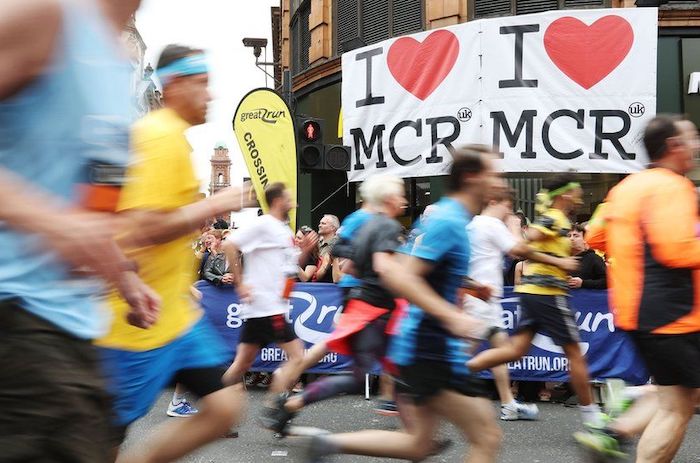
Celebrating the amazing people taking on Great Manchester Run in 2025

Frankie Lipman steps into Lady Macbeth’s shoes in gutsy new take on Shakespeare


Best bars and pubs to watch the football and live sport in Manchester











